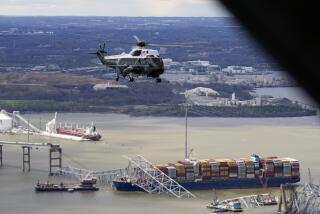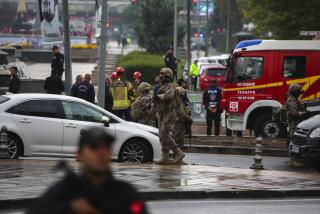Blasts in Karbala and Baghdad kill at least 46
- Share via
BAGHDAD — Bombers killed at least 46 people in two attacks Saturday that made increasingly clear the weaknesses of a U.S.-Iraqi security plan, including 34 who died in the holy city of Karbala when an explosion tore through a bus station near a Shiite shrine.
Twelve more people died when a blast hit a bridge linking the two sides of the capital.
It was the second time in three days that a bomb went off on a bridge spanning the Tigris River, which snakes through Baghdad. Though Saturday’s attack appeared aimed at a military checkpoint on the Jadriya Bridge, not at the structure itself, the incident was sure to increase anxiety among Iraqis who must cross from one side of Baghdad to the other.
The bombings, coming in the third month of the security plan, also left scores wounded.
Despite the deployment of thousands of additional U.S. and Iraqi troops, bombers continue to get past checkpoints and even infiltrate the capital’s fortified Green Zone, where U.S. and Iraqi government offices are located. A bombing Thursday inside the Iraqi parliament building Thursday killed a lawmaker.
In addition, U.S. military officials acknowledge that the security focus in Baghdad has driven insurgents to areas outside the capital, where large-scale attacks have increased.
Army Maj. Gen. William B. Caldwell IV, the U.S. military spokesman, said at a news briefing Wednesday that the number of civilian deaths had gone up nationwide since January.
Figures compiled by the Associated Press and based on Iraqi police reports showed that the number of civilians killed outside Baghdad in the eight weeks since the security sweep began Feb. 13 was 1,504, compared with 1,009 in the eight weeks preceding the launch.
In the same time period, the number of civilians killed in Baghdad in attacks linked to Iraq’s civil war dropped from 2,871 to 1,586.
In Karbala, frustration with the government’s inability to protect its citizens boiled over into violence Saturday.
The suicide car bombing took place a few hundred feet from one of Iraq’s most revered Shiite Muslim shrines, dedicated to Imam Hussein. Afterward, young men began hurling rocks to protest the failure of security forces to protect them. Some then marched to the provincial government headquarters to continue their protest. They dispersed after police fired in the air, a government spokesman said. One witness said the protesters burned and overturned at least one police vehicle.
The Karbala governor, Akeel Mahmoud Qazali, accused the prime minister and the Defense Ministry of failing to respond to requests for more security in the city. Karbala, like Najaf, another holy city about 60 miles away, is invariably packed with Shiite pilgrims.
Qazali said security forces in Karbala lacked the experience and training to spot threats and that the latest bomb-detectors were not yet available to them. Instead, he said, security forces “depend on picking up strange visitors” whom they suspect of being troublemakers.
“There should be a heavy deployment and a high intelligence unit responsible for collecting information about possible bombings and explosions,” the governor said.
The bomber got past security officials and entered a garage, where he detonated the device, Qazali said.
Hussein Ali Fadhil, a vendor, said the force of the blast threw him back several feet.
“I saw black smoke. I saw glass smashed and scattered in front of the buildings,” he said. “I saw the shoes, the headdresses of some people left at the scene.”
Another witness, Raid Zaini, said police fired shots to disperse the protesters, killing one young man. That fueled more anger, and they headed toward the government office, Zaini said.
Hospital officials said more than 150 people were injured in the bombing.
The incidents were likely to test the commitment of politicians who, after Thursday’s parliament bombing, pledged to put aside their differences and work together to stabilize Iraq.
By Saturday, those promises, uttered in a solemn session Friday, seemed to have been forgotten.
Saturday’s parliament session included testy exchanges among politicians about who was to blame for security lapses that allowed a bomber to enter the building.
Later, the leader of the Shiite political bloc loyal to anti-U.S. cleric Muqtada Sadr blamed the U.S. military presence for the violence in Iraq.
“Now, everything is being targeted in Iraq: politicians, workers, intellectuals, schools and universities, bridges, houses, the parliament.... Everything!” said Nassar Rubaie of the Sadr bloc, which holds 30 seats in the 275-seat assembly and controls six ministries.
The bridge bombing occurred at a spot where teenage drag racers congregate on weekends. Hours after the late-morning incident, the charred remains of three minivans and a sedan remained. The bridge was undamaged.
A bomb Thursday sent huge chunks of a steel bridge in north Baghdad tumbling into the river, but the bridge hit Saturday is a heavier concrete structure that could not be brought down by a single car bomb.
Dozens of other incidents plagued Iraqis on Saturday. In Baqubah, the capital of restive Diyala province, a roadside bomb killed three Iraqi police officers.
In Baghdad, 11 people were killed in shootings, mortar attacks and bomb blasts, in addition to those killed in the bridge incident. They included three bodyguards of a deputy Cabinet minister killed when gunmen opened fire on his convoy. The deputy minister was not injured.
In the southern city of Basra, British forces said they killed eight insurgents in overnight clashes.
Times staff writers Said Rifai, Raheem Salman, Suhail Ahmad, special correspondent Saad Fakhrildeen in Najaf, and correspondents in Baghdad contributed to this report.
More to Read
Sign up for Essential California
The most important California stories and recommendations in your inbox every morning.
You may occasionally receive promotional content from the Los Angeles Times.














